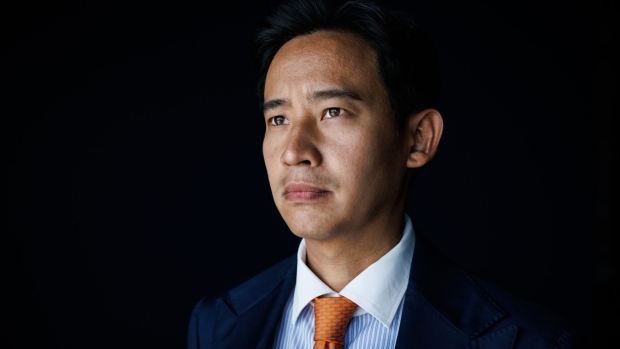Jan 23, 2024
Thai Court to Rule on Former PM Candidate Pita’s Lawmaker Status
, Bloomberg News

(Bloomberg) -- A top court in Thailand cleared former prime minister hopeful Pita Limjaroenrat of allegations that he had violated election rules by owning shares in a media firm, a case cited by his opponents to block his bid for the country’s top job last year.
The Constitutional Court ruled that Pita’s shareholding in ITV Pcl didn’t violate rules as the company wasn’t considered a media firm since 2007 and had not derived any revenue from such operations. Pita, who was suspended as a member of the House of Representative in July after the court accepted the allegations by the Election Commission, will have his lawmaker status restored immediately.
The poll agency had brought the case against Pita after his reformist Move Forward party won the most seats in the general election held in May and he was chosen as the prime ministerial candidate of a pro-democracy coalition.
Thailand’s constitution bars politicians seeking public office from owning shares in media firms to prevent them from abusing the platforms for personal gains and to protect media freedom.
“This is just one of several cases hanging over Move Forward,” said Peter Mumford, Southeast Asia practice head at Eurasia Group. “Neither Pita nor the party can be sure they are out of the woods yet.”
Though Pita held ITV shares while registering as a candidate, as alleged by the election panel, the firm not being active in media business meant he was eligible to run for parliament, the court said in a majority ruling. It also noted that Pita could have transferred the controversial shares before 2019 when he first took a political office.
Pita had claimed he only managed shares as part of an estate left behind by his father, who passed away in 2006. After his opponents raised an uproar following the election, he transferred all 42,000 shares, or 0.003% of ITV’s total shareholding, to his younger brother.
Supporters cheered the Harvard alumnus outside the court and his Move Forward Party said it was looking forward to him returning to lead the group in parliament again.
Pita, who quit as party leader after the election, said he will resume his lawmaker duties as soon as possible. “In my mind it’s all about the next steps and the work that needs to be done,” he told reporters.
Pita’s bid for premiership was blocked by the military-appointed Senate that voted against him alongside the conservative members of the House even though he was backed by parties including Pheu Thai, linked to former premier Thaksin Shinawatra. That paved the way for a new coalition headed by Pheu Thai, which eventually joined hands with a string of conservative and pro-military groups to install Srettha Thavisin as the prime minister.
The Constitutional Court is scheduled separately to rule on Jan. 31 whether Move Forward violated the charter with its election campaign to amend the lese majeste law that protects the monarchy from defamation. A decision against Move Forward may eventually lead to its dissolution and a ban on its leaders from active politics, similar to a verdict almost four years ago that quashed its predecessor, Future Forward.
Pro-democracy factions in Thailand have a history of dominating elections only to be routinely booted out of office either through military coups or court rulings. Future Forward’s leader Thanathorn Juangroongruangkit, a one-time prime minister candidate of the opposition bloc, was disqualified in 2019 after the same court found him guilty of holding media shares on the date he registered his candidacy.
“Today’s ruling also doesn’t give us any real hints about what lies ahead for Pita,” said Napon Jatusripitak, a visiting fellow at the ISEAS-Yusof Ishak Institute. “If anything, this might just be the calm before the storm, possibly aimed at tempering public pressure on the courts in the lead-up to the crucial ruling next week.”
--With assistance from Suttinee Yuvejwattana and Pathom Sangwongwanich.
(Adds details and quotes from second paragraph.)
©2024 Bloomberg L.P.







